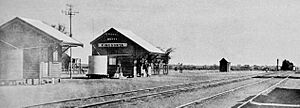Kingoonya facts for kids
Quick facts for kids KingoonyaSouth Australia |
|||||||||||||||
|---|---|---|---|---|---|---|---|---|---|---|---|---|---|---|---|
| Established | 7 June 1928 (town) 23 October 2003 (locality) |
||||||||||||||
| Postcode(s) | 5710 | ||||||||||||||
| Elevation | 148 m (486 ft) | ||||||||||||||
| Location |
|
||||||||||||||
| LGA(s) | Pastoral Unincorporated Area | ||||||||||||||
| Region | Far North | ||||||||||||||
| State electorate(s) | Giles | ||||||||||||||
| Federal Division(s) | Grey | ||||||||||||||
|
|||||||||||||||
|
|||||||||||||||
| Footnotes | Adjoining localities | ||||||||||||||
Kingoonya, originally spelled Kingoonyah (pronounced KING-goon-yə), is a tiny, almost empty settlement in the middle of the Australian outback. It is located in the state of South Australia. The town was started in 1916 as a railway settlement. Its main purpose was to provide fuel for steam trains and help maintain the tracks. It also supported about 200 families who lived on nearby sheep farms.
Contents
Kingoonya's Past: A Railway Town
For thousands of years before British settlers arrived, Indigenous Australians lived in the Kingoonya area.
The Kingoonya Post Office first opened around 1884. It closed for a while but reopened in 1915 when the Trans-Australian Railway was being built. It finally closed for good in 1982.
Life in a Railway Settlement
In 1917, Kingoonya grew a lot when it became an important station on the new Trans-Australian Railway. Many workers were needed to supply water and coal for the steam trains. Water was even taken by train to Barton, about 269 kilometers (167 miles) to the west. Drinking water came from Port Augusta.
After 1951, fewer railway workers were needed. This was because trains started using diesel-electric engines instead of steam. Also, about 30 years later, new concrete sleepers (the supports under the tracks) and continuously welded rails were introduced. These needed much less maintenance.
In the early 1990s, railway maintenance was given to private companies. This meant Kingoonya lost its last railway workers and their families. Since then, the few remaining houses have only been used sometimes by people working in mining or kangaroo shooting.
Kingoonya Today: A Stop for Travelers
Even with very few permanent residents, the Kingoonya Hotel is still open. It's popular with travelers and people from the surrounding sheep and cattle farms. The hotel offers places to stay and food.
The town is also a common stop for people driving off-road. They use the dirt tracks heading west towards Tarcoola or south past Lakes Everard and Gairdner. There's also a track to the Eyre Highway across the Nullarbor Plain.
A Rare Find: Black Opal
There are stories that small amounts of black opal can be found in the area. This belief grew after a child in 1968 found a rare black rainbow opal in a roadside pit near the main street.

Impact of Nuclear Tests
Kingoonya was one of the settlements affected by the British Government's nuclear weapons tests in the 1950s at Maralinga. During these tests, local Indigenous Australians were forced to leave their traditional hunting lands. Some lived for about ten years in a temporary hut settlement a few kilometers north of Kingoonya. They lived simply, and their government payments were sometimes helped by selling crafts like spears, boomerangs, and woomera throwing sticks to passengers on passing trains.
For many years until the 1990s, residents depended on two supply trains for their weekly food and mail. Today, passenger trains like the Indian Pacific (which runs between Sydney and Perth) and The Ghan (which runs between Adelaide, Alice Springs, and Darwin) no longer stop in Kingoonya.
The town was even featured on Australia Live. This was a four-hour TV broadcast on January 1, 1988, celebrating Australia's 200th birthday.
How Kingoonya is Governed
Kingoonya is part of several government areas. It is in the federal Division of Grey and the state electoral district of Giles. It is also part of the Pastoral Unincorporated Area of South Australia and the state's Far North region.
Because there isn't a local council in Kingoonya, a state government agency called the Outback Communities Authority provides services to the community.



